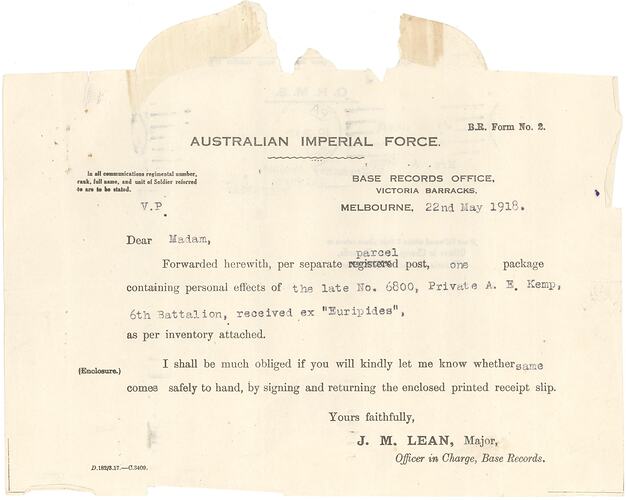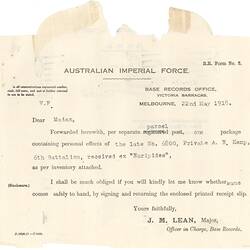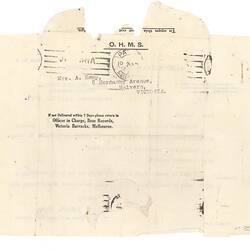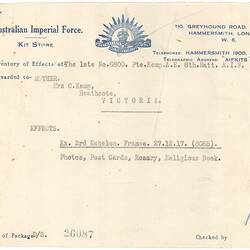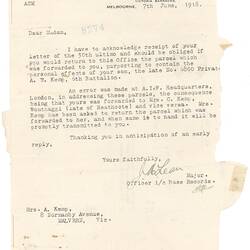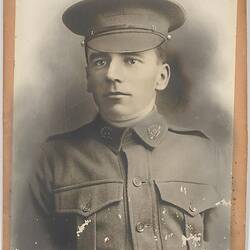Summary
Alternative Name(s): Lettergram. Aerogram
Letter from the Australian Imperial Force In Melbourne to Mrs Annie Kemp relating to the return of personal effects from her husband, Private Albert Kemp, a World War I soldier killed in action on 21 September 1917.
The letter explains that she is receiving the a parcel of personal effects from her late husband Private A. E. Kemp, who was killed in the trenches during World War I. It requests that she return an enclosed slip to confirm receipt of the parcel. The parcel in fact contained the personal effects of another, similarly-named soldier; Private A. E. Kemp's effects were in turn sent to that other person in error. Each was asked to return the parcel within a matter of weeks. No apology was made for what must have been a heart-rending mistake, made at the A.I.F. Headquarters in London. Annie eventually received the proper parcel nearly a year later, on 25 May 1919. It contained photographs, postcards, a rosary and a 'religious book' (according to his service record held at the National Archives).
A copy of the letter (probably a carbon copy) is held at the National Archives (barcode 7368872).
Physical Description
Single page off-white paper form letter, printed on both sides. Information has been added with typewriter. Postal stamp (ink) on one side. Letter is irregular at top from having been torn open. Remnants of adhesive tape at tear visible.
Significance
Albert Edward Kemp was a 32-year-old butcher, living at 8 Normanby Ave, Caulfield and married to Annie Josephine, when he enlisted. Born in South Yarra, he was a small man, 5'4½", and weighed only eight stone. He and Annie had a daughter, Ethel Mavis, and a son, George Percival.
Albert enlisted at Royal Park on 4 October 1916, and was assigned to the 22nd Reinforcements, 6th Battalion - regimental number 6800. His battalion left Melbourne 25 October 1916 - just 21 days after Albert enlisted - on the "Ulysses" with two officers and 150 O/Rs. The ship arrived in Plymouth three days after Christmas.
A little over one month later, on 1 February 1917, Albert was disciplined for being absent without leave from midnight and was apprehended the next afternoon. He forfeited 18 days' pay for his offence. He was shipped to France on 27 March, and probably went into action in the trenches. On 13 July Albert was again in trouble, this time for disobeying orders from a superior officer. (It is unclear what his punishment was, but "48 hours" may refer to imprisonment).
Two months later, on 21 September 1917, Albert died in the trenches in Glencross Wood, France (according to his memorial medal and the Roll of Honour, but his Field Service record says he died in Belgium). He is buried at 29 The Ypres (Menin Gate) Memorial, Belgium. His name is located at panel 47 in the Commomorative Area at the Australian War Memorial.
Some time in 1918, Albert's belongings were sent in error to a family who had lost a member by the same name in Wonthaggi, and Annie received that man's belongings. In June she was asked to return the other Pte Kemp's belongings.
Annie received a war pension, but appears to have fallen on hard times - suggested by her need for assistance with a grocery bill approved in one of the documents. She moved to 19 Raleigh St, Malvern in 1922. It is unclear what happened to Ethel, as only George is mentioned from the early 1920s. Further research is required.
The family's home at 8 Normanby Ave is still standing, largely with original façade; their street overall is also largely original.
More Information
-
Collection Names
-
Collecting Areas
-
Acquisition Information
Purchase from Mr Jeff Kemp, 07 Dec 2006
-
Maker
Base Records Office, Australian Imperial Force (AIF), Victoria Barracks, Melbourne, Victoria, Australia, 22 May 1918
-
Person Named
Private Albert E. Kemp - 6th Battalion, Australian Imperial Force (AIF)
-
Addressed To
-
Inscriptions
Text: AUSTRALIAN IMPERIAL FORCE./BASE RECORDS OFFICE/VICTORIA BARRACKS/MELBOURNE 22nd May 1918/Dear Madam,/Forwarded herewith, per separate parcel post, one package/containing personal effects of the late No. 6800, Private A.E. Kemp/6th Battalion, received ex "Euripides"/as per inventory attached./I shall be much obliged if you will kindly let me know whether same/comes safely to hand, by signing and returning enclosed printed receipt.
-
Classification
-
Category
-
Discipline
-
Type of item
-
Overall Dimensions
18 cm (Length), 21.9 cm (Width)
-
Keywords
Death & Mourning, Wars & Conflicts, World War I, 1914-1918, Making History - Kemp Mourning Collection
